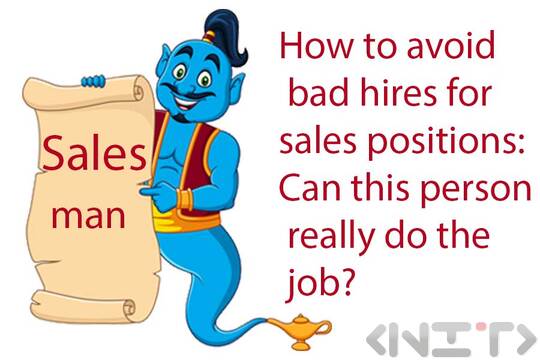
Approximate reading time: 3m 28s
How to avoid hiring the wrong people for sales manager: how do you know if this person can really do the job?
Are you familiar with the problem of hiring salespeson? No? The problem is that as salespeople, they are good at convincing the sales manager that they can do things they can't.
This is because sales managers are often pressured to fill positions and meet sales goals and allow themselves to be driven by the emotions and biases of hiring salespeople without even realizing it.
As a result, sales managers often hire unsuitable or unskilled candidates who will have to be replaced in just a few months. This is both a failure and a black spot on their reputation and good judgment.
It is one thing to want, it is another to be able, and third and fourth to do it, as the writer Nikolai Haitov said. Therefore, when the sales manager selects salespeople, he must be able to recognize those who pretend to be those who can really sell or are experienced enough for the position.
If we consider the following scenario:
You have had a vacancy for a welding robot dealer for three months now and the situation really cannot be postponed. Finally you get a suitable application from a man, let's call him Ivailo, who worked for two manufacturers. Ivaylo has the engineering experience needed for your vacancy. He also has good recommendations from his previous sales managers. You begin to think with hope, "We have found our man."
Unfortunately, you are in the greatest danger when conducting the interview. Why? You want to hire someone for the position so much that this strong desire and urgent need for a sales manager can mislead you. Ivailo can look like an ideal sales manager both on paper and live - smart, educated, confident. You want him so badly to be able to do the job that you avoid asking him difficult questions so as not to trip him up and realize that he is not suitable for the job of a sales manager and that you will have to start the search again.
Psychologists call this confirmation bias. It is the tendency of people to give preference to information that confirms their preliminary concepts or hypotheses, regardless of whether the information is true. As a result, people collect information and recall it selectively, interpreting it in a way determined by their personal preferences and preferences.
In a University of Missouri study, researchers analyzed recorded job interviews from three interviewers in a large corporation. They found that when interviewers had a good first impression of the candidates, they asked fewer questions about their qualifications. Instead, they praised their company for trying to "sell" it to the candidate to make it work for them. Here is an example of improper employment.
So, you go to interview Ivailo for a welding robot dealer. It is good to think about 2 things: 1) what data you have collected from his CV - what is his experience, education, qualifications and 2) what you will want him to do for your company - the goals you want him to achieve.
If Ivailo is an impostor, then he would focus on the data from the CV, education, experience. These people do not want to be questioned at length about the results achieved. But this is exactly what you need to do by delving into two topics: responsibility and knowledge.
First, it is good to know whether, as a sales manager, Ivailo was responsible for concluding the deals. For your work, you need someone who can close complex sales by convincing many buyers and turning them into customers.
To determine if Ivailo did this, you can use the Responsibility Drill Down technique. Here's how this technique works.
The conversation during the interview
You: "Did you negotiate with clients when you had to gain the trust of many participants, including top managers?"
Ivailo: "Yes."
You: "Tell me about such a deal."
Ivailo: "I signed a contract for five million dollars with HP. We had to convince the CEO, CFO and operations manager that our product was superior to the products of two competitors. ”
You: "Did you personally initiate the contacts and lead the performances with these people?"
Ivailo: "I had a key role."
You: "Was your sales manager involved?"
Ivailo: "Yes."
You: "So he was mainly responsible for closing the sale?
Ivailo: "Technically, yes."
and then, a "Red Flag" should appear in your head
Only with 5 investigators did you find out that Ivailo did not make the sale himself. His sales manager did it.
Does this mean that Ivailo is not qualified to do the job you are looking for? Not necessarily. But the way he presents his level of responsibility should warn you and signal you with a red flag.
The next step is to check the level of Ivailo's knowledge, as well as whether he knows what is necessary for the job for which you are going to hire him. You can use the same technique by asking questions that go deeper into the answers to the previous question. In this way you will understand that either he has the necessary knowledge or he will pretend that he does not know what is necessary.
Last tips: No matter how much you need the trader and no matter how much you want to fill the empty chair in your team, do not give in to your desire, but check the data described by the candidate, as well as his experience and responsibilities he had . Take the time to prepare questions that only a qualified candidate will be able to answer. This way you will be able to find your sales person.